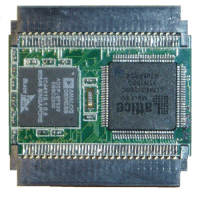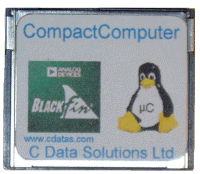Tiny CompactFlash computer gains USB carrier board
Jun 9, 2011 — by Eric Brown — from the LinuxDevices Archive — 2 viewsC Data Solutions announced a carrier board for its tiny CompactFlash-based Compact Computer (CoCo) that enables expansion via third party USB devices. The CoCo carrier board adds dual USB host ports to the uClinux-based CoCo, which offers a 500MHz Blackfin processor with 32MB SDRAM, 8MB flash, and an FPGA, and enables rapid prototyping of devices with a mix of CompactFlash peripherals.
C Data Solutions shipped its original Compact Flash Computer in 2004, and followed up in 2007 with a more powerful Compact Computer (CoCo), which incorporates a programmable 500MHz Analog Devices, Inc. (ADI) Blackfin DSP (digital signal processor) and an integrated Lattice field-programmable gate array (FPGA).
This CoCo design appears to have remained largely unchanged since then, and was part of a data acquisition motherboard C Data announced in 2009. The board was aimed primarily at a single customer, however, and does not appear to be currently available.

Coco carrier board with Coco SBC mounted on top
(Click to enlarge)
The CoCo offers both a standard CF interface, and a CF interface that is used to access additional peripherals within a connected carrier board such as C Data's USB board. The CoCo (below, left) can plug into any host's CF slot as a device, or alternatively act as a CF host to control other off-the-shelf CF peripheral cards. In addition, the CoCo Blackfin computer module (pictured below, right) can be soldered into a motherboard to control an SBC.


CoCo (left) and CoCo Blackfin module (right)
The new carrier board, which does not appear to be much larger than the CoCo itself, extends the CoCo's modular architecture to USB peripherals by adding dual USB host ports. The USB interface is controlled by the CoCo's uClinux USB stack, says the company. The pre-installed open source, minimalist uClinux distribution is touted for its maturity, broad range of tools, large user base, modular software, and ease of development.

Coco carrier board block diagram
The CoCo carrier board is aimed at low-cost rapid development and prototyping, as well as low volume applications with runs of below 100K units, says C Data. It is said to be especially suitable for devices with significant power and space constraints, and devices that require considerable I/O customization options.

Coco block diagram
Different processor/application specific module options will be made available for the CoCo carrier board, says C Data. In addition, future plans call for additional carrier boards, says the company.
Availability
The CoCo carrier board appears to be available now, at an undisclosed price. More information on the CoCo may be found at C Data Solutions' website, and hopefully, C Data will add more on the carrier board there as well.
This article was originally published on LinuxDevices.com and has been donated to the open source community by QuinStreet Inc. Please visit LinuxToday.com for up-to-date news and articles about Linux and open source.